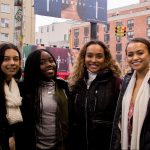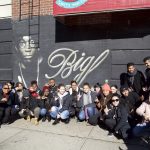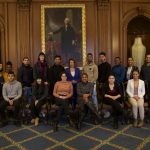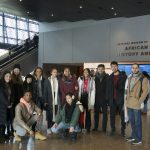
The Paths of Esther Madríz Diversity Scholars
The Esther Madríz Diversity Scholars (EMDS) is a living-learning community that explores issues of diversity, inequality, social justice, and social change. Named after the late Esther Madríz, beloved USF professor of sociology who embodied the Ignatian ideals of education of the whole person as a means toward social justice, Esther Madríz Diversity Scholars examine and challenge these boundaries to gain a fuller understanding of ourselves and the world around us. The program approaches hip-hop through sociological frameworks to explore the role of poverty, globalization, immigration, racism, sexism, homophobia, unemployment, incarceration, and urban marginality. During winter break students participate in a transborder travel experience (previous destinations include: Cuba, New York City, Marseille, and more) to gain new perspectives on social problems and their solutions.
Below are excerpts from some of the EMDS Cohort 12’s reflections on their experience during fall and winter of this year:
Natalie Mills, Kinesiology ’20
We started our curriculum with learning about the sociology of hip-hop. I grew up with my papa rapping, “I said a hip-hop, hippie to the hippie, the hip, hip a hop, and you don’t stop,” to me and my brother, making us giggle. Through the EMDS program, I soon discovered that songs like “Rapper’s Delight” were pivotal points in the history of hip-hop. We have learned about the influences from Barbados and Jamaica, and how Afrika Bambatta turned the practices of yard parties into one of the integral elements of hip-hop: djing. The history and art of the Bronx that emerged from the struggle of black and brown folks has inspired me. I also learned about the politics surrounding the art of graffiti, which opened my eyes to government’s systematic oppression of youth of color. The art of hip-hop can be explained as a means of resistance and a loud voice of the struggle.
Chaniece Jefferson, Art History ’19
One particular reading, Reflection in Service Learning: Making Meaning in Experience, helped me and my fellow students begin a dialogue about cultural competence. My cohort has provided a space for me to see things in new perspectives and challenge ideas. An issue we have discussed thoroughly is around gentrification, and how we as college students can be seen as gentrifiers ourselves in San Francisco. One memorable event that I was able to attend was a showing of the documentary film Dolores. We had the honor and privilege of meeting Dolores Huerta herself, and it was a life-changing experience. Meeting someone who has sacrificed so much for her activism shifted my way of thinking and made rethink the roles I’m in and how I could become more like her. Most importantly, it made me rethink about what I would like to do with my college education and what I want to do in life.
Isaac Baron, Politics ’20
For my community work, I’ve had the privilege of working with San Francisco Rising on the College for All campaign. This has been an experience that I felt allowed me to recognize the level of privilege I have as a student pursuing higher education. It has made me reflect on my experience back home in Santa Barbara, and the economic disparity and how that parallels the educational disparity as well. Many of the people I grew up with either did not finish high school or did not pursue an education beyond it, so the idea of holding an internship with a community organization while attending an institution of higher learning never really crossed my mind growing up. In this way, I feel that the program has allowed me to cross a border set in an economic class that I never thought I would cross. The campaign that we’re working on through San Francisco Rising would make public education through California public colleges and universities free by establishing a grant funded by a tax that would cover tuition costs for students. This would make higher education more accessible to those who see their personal economic situation as a barrier.
Alegra Bauder, Fine Arts ’20
The experience we had traveling to New York and to Washington D.C. is one that I will always cherish. Meeting and engaging with all of the people and organizations was a privilege and enhanced what we had learned over the semester. At Howard University and One D.C., I saw how gentrification and urban renewal affects other communities outside of San Francisco. In New York, and especially in the Bronx, seeing everything we had learned about the culture and world of hip-hop came to life, and it was incredible. I think that going to different boroughs and communities within the city helped me to fully grasp the long-term effects of what we had studied, such as planned shrinkage and benign neglect. Seeing it first hand, it’s obvious that the injustices that occurred in neighborhoods there are still evident today. By engaging with other communities, my EMDS cohort has begun to better understand our own communities in San Francisco.
Check out the slideshow from Cohort 12’s trip to New York and Washington, D.C.:
- Democracy Now with Amy Goodman
- Apollo Theater
- Apollo Theater
- Students with Congresswoman Nancy Pelosi
- National Museum of African American History and Culture
- Democracy Now















